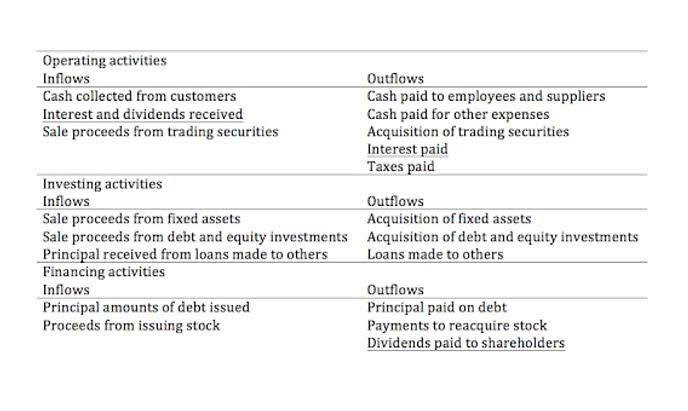Most accounting software will automatically import your bank data so you don’t have to manually enter and organize each transaction. If you’re using spreadsheet software as your GL, you’ll need to enter each transaction by hand. If a general ledger is like a book, a chart of accounts is like a book’s table of contents—it’s a list of all the accounts your business uses to record transactions.
You’re our first priority.Every time.
Developing a reliable accounting system for entrepreneurs is key to monitoring your company’s financial health and creating effective business strategies. It’s also a valuable way to share financial information with investors and shareholders so you can grow your business. Accounting gives you a handle on your company’s assets and liabilities and how they change over time, which lets you monitor the growth of your business. You can understand what services are driving the most revenue in your business, which can help you adjust your business model to further grow your profits.
Bookkeeping and Accounting go hand in hand.
At Business.org, our research is meant to offer general product and service recommendations. We don’t guarantee that our suggestions will work best for each individual or business, so consider your unique needs when choosing products and services. Expand your bookkeeping knowledge by brushing up on the most common bookkeeping errors (and how to avoid them).
How much is QuickBooks for small businesses?
- Spreadsheet-based bookkeeping uses tools like Microsoft Excel or Google Sheets to track and organize financial data, offering more flexibility and automation compared to manual methods.
- While any one of these can make your life much easier, you still may need some help from an accountant to understand how to properly use them.
- When manually doing the bookkeeping, debits are found on the left side of the ledger, and credits are found on the right side.
- Bookkeeping can help Entrepreneurs keep track of their finances and make better decisions about where to allocate their resources.
- With all of the bookkeeping records and financial reports already prepared, filing income taxes becomes a much quicker and easier process.
- While each of these is important and deserving of your time and focus, entrepreneurs must wear many hats.
Some are happy acting as a one-person business, but want to maximize their revenue streams. If you don’t have the budget to hire an accountant, you’ll need to be your own. Even if you do have an accountant, you should understand enough about the subject to have meaningful conversations with potential partners, investors, employees, and others. But even if an expense is ordinary and necessary, you may still not be able to deduct all of it on your taxes. Just because you do most of your work from your dining room table doesn’t mean that you can deduct your entire monthly rent. Luckily, the IRS has put together a comprehensive guide on business deductions that you can consult if you’re ever unsure about a deduction.
- Learn more about how entrepreneurs use accounting and financial statements and when to prepare income statements with frequently asked questions about entrepreneur accounting.
- You’ll save time chasing receipts, protect yourself from costly errors, and gain valuable insights into your business’s potential.
- And the only way to know that for sure is to have accurate, up-to-date books.
- Bookkeepers ensure that every financial transaction is accurately recorded in the business’s books, keeping an organized system to track financial activities.
- Accounting is also essential for the day-to-day management of cash flow and expenses, and for preparing the necessary information to file business taxes.
- Compare your financial performance across different periods, such as month-over-month or year-over-year, to gauge your progress and identify areas of growth or concern.
- While many self-employed individuals manage their own bookkeeping, there may be situations where seeking professional help is beneficial.
Bookkeeping is the process of recording all your business’s financial transactions systematically. It involves tracking income, expenses, assets, liabilities, and equity. This data provides a clear picture of your financial health and helps you make informed business decisions. Knowing the bookkeeping basics for entrepreneurs is an essential part of running a successful business. It’s the only way to keep track of your income, expenses, and profits, as well as make sure that all taxes are paid on time. While bookkeeping may seem intimidating to those who are unfamiliar with it, having a basic understanding of the fundamentals can help make the process much easier.
If you have a larger business, or if you want to get a better sense of your company’s overall financial health, accrual accounting may be a better choice. With accrual accounting, you’ll get a more accurate picture of your company’s income and expenses. As a business owner, it is important to understand your company’s financial health.
- For example, you may find yourself in a dispute with a vendor or under audit by the government.
- Though often confused for each other, there are key differences between bookkeeping and accounting.
- When Entrepreneurs have accurate records of their income and expenses, they can more easily prepare their taxes and ensure that they are paying the correct amount of taxes.
- When selecting a bookkeeper or accountant, look for professionals with experience working with self-employed individuals or small businesses in your industry.
- Returning to the example of Shanti’s website design business, let’s compare two scenarios of startup purchases to see the effects on the accounting equation.
As your business grows, you may find that double- or triple-entry bookkeeping is necessary to keep track of all your transactions. Whichever method you choose, make sure you keep accurate records so you can make sound financial decisions for your business. Although financing https://www.bookstime.com/ and accounting complement and rely on each other, they are distinct. Accounting is the system of recording and classifying financial transactions related to a business, and summarizing and communicating those transactions in the form of financial statements.
FreshBooks accounting software offers a straightforward way for entrepreneurs to manage their own accounting. Features like expense tracking and reporting help you manage your spending, while time bookkeeping basics for entrepreneurs tracking and invoicing make it easy to bill your clients. Try FreshBooks free to discover how the right accounting software can provide you with the tools to manage your business accounting.




